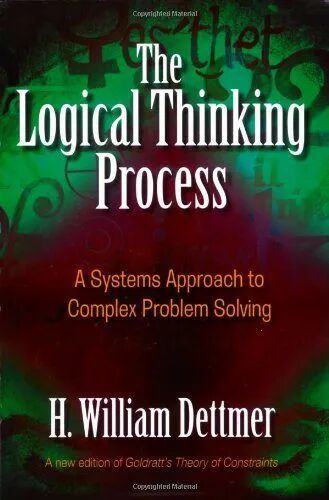Theory of Constraints, Critical Chain Project Management, Lean : industry consulting & training - Marris Consulting
10 signs you need to consider Logical Thinking Process
10 signs you need to consider Logical Thinking Process
Here are 10 signs pointing to the need to consider using the Logical Thinking Process in order to help you solve your complex problems and structure your transformation plan.
Don’t know what The Logical Thinking Process is?
>The Logical Thinking Process in a nutshell
The Logical Thinking Process is a great help if You:
1. do not know how to properly state your Vision and Goal
2. are unsure about what is required to achieve your Goal
3. are afraid of costly and questionable “nice-to-haves” your staff is asking for
4. have no benchmark for orienting and monitoring all efforts
5. have no idea how far your organization is from the Goal
6. are stuck with conflicting objectives or constraints
7. do not know what to do to close the gaps and achieve your Goal
8. are afraid about possible negative side effects and obstacles of your plan
9. are uneasy about how to communicate the necessary changes
10. would like to have a list of prerequisites for successful change

1. You do not know how to properly state your Vision and Goal
Surprisingly many employees, from shop floor to top managers, don’t know precisely what the Goal of the company is or have different views on it. How can they align their contribution if the Goal is not clear or understood in different ways?
The Logical Thinking Process starts with a clear and unambiguous Goal statement, an absolute must in order to meet success. A powerful multipurpose tool will help: the Goal Tree.
2. You are unsure about what is required to achieve your Goal
The Goal Tree describes all required Necessary Conditions to be fulfilled for achieving the Goal. These Necessary Conditions are listed from a sound and robust analysis using only “necessity-based logic”, in a scientific approach.
3. You are afraid of costly and questionable “nice-to-haves” your staff is asking for
With the Necessary Conditions listed, only those complying to the logical “necessity-based logic” will be kept. All others, not strictly necessarily will be discarded.
This is a very powerful means to filter out all the personal wishes and “nice-to-haves”.
4. You have no benchmark for orienting and monitoring all efforts
Once the Goal Tree is completed, it is a system-wide benchmark of what is required to achieve the Goal. The Goal Tree is then used to check the status of each Necessary Condition and the overall progress towards the Goal.
A Goal Tree is valid as long as the business environment does not drastically change, so the few hours investment in building the Tree is definitely worth it.
5. You have no idea how far your organization is from the Goal
Besides the Goal Tree, the Logical Thinking Process provides other tools among which the Current Reality Tree, describing the actual state of the organization in regards of gaps to the Goal.
The Current Reality Tree is build starting from difficulties and problems encountered by the organization and goes down to the very few root causes, discovered using the cause-effect logic.
Treating the few root causes will solve many problems at once as they are only multiple Undesirable Effects related to a same cause.
6. You are stuck with conflicting objectives or constraints
Among the obstacles on the road to the Goal, conflicting objectives or constraints are common. To tackle these conflicts, the Logical Thinking Process provides a tool called Conflict Resolution Diagram. Based like the other tools on logic, it helps to debunk myths and false beliefs as well as find win-win solutions to conflicts.
7. You do not know what to do to close the gaps and achieve your Goal
The Logical Thinking Process depicts the desirable future state with a Future Reality Tree in which the previously listed obstacles and problems have been removed or by-passed with appropriate solutions.
The “difference” between the Current Reality Tree and the Future Reality Tree are the gaps to fill in order to achieve the Goal.
8. You are afraid about possible negative side effects and obstacles of your plan
Simple elegant or sophisticated solutions may look good on paper but can mess up more than solve current problems. Fearing something could go wrong and lead to a worse condition can paralyze initiatives.
In order to prevent possible negative side effects, the Logical Thinking Process provides “stress test” and robustness assessments. Among them, any possibility for negative side effects to develop is scrutinized.
If one pops up, an appropriate preventative countermeasure is defined. At the end of the analysis, the robustness of the solution is guaranteed.
9. You are uneasy about how to communicate the necessary changes
The Logical Thinking Process and its tools provide robust and straightforward means to communicate what the necessary changes are, why and how to make the change happen.
As everything is based on sound logic, it is free from any emotional biases and verifiable by anybody, making the communication very robust and compelling.
10. You would like to have a list of prerequisites for successful change
Everybody wants a clear roadmap and concrete examples about what is to be done.
The Logical Thinking Process provides a logical Prerequisite Tree, listing all steps and Intermediate Objectives along the path to reaching the Goal.
The Logical Thinking Process is surely the most structured and robust way to lead the transformation of an organization, from its difficulties to its success.
If one of these 10 signs applies to your organization, you really should consider the Logical Thinking Process.

About Marris Consulting
Marris Consulting is an industry consulting and training company specialized in the Theory of Constraints (ToC) and Critical Chain Project Management. We focus on improving the performance of manufacturing and process industries by using Constraints Management combined with Lean and Six Sigma. To boost project performance, we also use Critical Chain Project Management (CCPM), which we sometimes combine with Lean Engineering. Our 2-day performance audits, our performance consulting services and our project management, Lean, ToC & CCPM training by our industry consultants offer a wide range of solutions to help our clients around the world reach the highest possible levels of performance.


